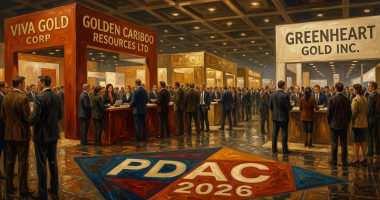By David Yeoman, Crux Investor
- Leading Edge Materials has a portfolio of critical raw materials projects in the EU, including the Norra Kärr heavy rare earths project in Sweden, the Woxna graphite mine in Sweden, and an exploration program in Romania.
- The company is focusing on advancing the Norra Kärr project, which has potential strategic importance for heavy rare earth supply in Europe.
- Leading Edge Materials is applying for strategic project status for Norra Kärr under the EU’s Critical Raw Materials Act, which could provide benefits like expedited permitting and facilitated access to capital.
- The company has updated the Norra Kärr project to improve sustainability and reduce environmental impact, including producing an industrial mineral byproduct and reducing land use.
- CEO Kurt Budge emphasizes collaboration and partnerships as key to developing projects in Europe’s critical materials ecosystem.
Leading Edge Materials (TSXV:LEM) is a Canadian and Swedish-listed company focused on developing a portfolio of critical raw materials projects within the European Union. As the EU pushes to secure domestic supplies of materials crucial for the green energy transition and high-tech industries, LEM is working to advance projects that could play a key role in these supply chains. The company’s main assets include the Norra Kärr heavy rare earths project in Sweden, the Woxna graphite mine in Sweden, and an exploration program targeting battery metals in Romania.
With new CEO Kurt Budge at the helm since May 2024, the company is sharpening its focus on advancing its flagship Norra Kärr project while also exploring opportunities to create value from its other assets.
Strategic heavy rare earths opportunity
The Norra Kärr project in southern Sweden is Leading Edge Materials’ most advanced and strategically significant asset. Discovered by the Swedish Geological Survey in the 1900s and explored by various entities since, Norra Kärr stands out for its potential to supply heavy rare earth elements (HREEs) – a subset of rare earths that are particularly crucial for permanent magnets used in electric vehicles and wind turbines.
CEO Kurt Budge emphasizes the project’s strategic importance, stating:
“Norra Kärr has been talked about as a strategic asset for a decade and specifically in one document that I came across said, if we get permitting and financing sorted out then Norra Kärr will be in production by 2020, and this document was written in 2014.”
The project has seen extensive technical work over the past 15 years, including two Preliminary Economic Assessments (PEAs) and a Pre-Feasibility Study (PFS) in 2015. It previously held a mining lease in 2013, which later reverted to an application status due to regulatory changes and permitting challenges.
Interview with Chief Executive Officer, Kurt Budge
Norra Kärr Project improvements & sustainability focus
Leading Edge Materials has recently updated the Norra Kärr project concept to enhance its sustainability profile and reduce environmental impacts. Key changes include adding production of Nepheline Syenite, an industrial mineral, as a byproduct, reducing the project’s land footprint by 65%, and decreasing water consumption by up to 30%.
These improvements aim to make the project more attractive from both an economic and environmental standpoint. The company is now pursuing a new mining lease application that reflects these changes. Budge notes:
“The sustainability of the project has gone up because we’re now producing not only a heavy rare earth concentrate, we’ve now got a nepheline syenite industrial mineral, and we’ve reduced the land take of the site by 65% and we’ve reduced water consumption by up to 30%.”
Critical Raw Materials Act & strategic project status
A key near-term catalyst for Norra Kärr is the potential to receive strategic project status under the EU’s Critical Raw Materials Act. Leading Edge Materials has submitted an application, with a decision expected by mid-March 2025. If granted, this status could provide significant benefits, including:
- A legal timeframe for permitting of 27 months
- Facilitated access to capital, potentially through the European Investment Bank
- Support in establishing offtake arrangements and partnerships along the value chain
This initiative reflects the EU’s growing focus on securing domestic supplies of critical minerals and could substantially de-risk the project’s development path.
Woxna Graphite Mine
Leading Edge Materials’ Woxna graphite mine in Sweden represents a built and permitted asset currently on care and maintenance. The project has the potential to produce a 94% graphite concentrate and has undergone testing for downstream processing into battery-grade anode material.
While Woxna is not the company’s primary focus at present, it represents a potential option on future graphite demand growth in Europe. The company is conducting a strategic review of the asset to determine the best path forward, which could include seeking partners or potentially divesting if an attractive offer emerges.
Romanian Exploration: Brownfield potential in battery metals
Leading Edge Materials holds a 51% interest (with an option to increase to 90%) in an exploration joint venture in Romania. The project is located in a historic mining district with extensive underground development, allowing for cost-effective exploration of polymetallic mineralization, including cobalt and nickel.
The company has recently commenced drilling at the site, with initial results expected in the coming months. This program represents a relatively low-cost option on potential battery metal discoveries in an EU jurisdiction.
Strategy & execution
Under CEO Kurt Budge’s leadership, Leading Edge Materials is adopting a focused approach to advancing its project portfolio. Key elements of the strategy include:
- Prioritizing Norra Kärr advancement: Securing strategic project status and a new mining lease are the near-term priorities.
- Collaboration and partnerships: Recognizing the need for a robust ecosystem to develop critical mineral projects in Europe, LEM is open to partnerships along the value chain.
- Flexible capital allocation: The company is maintaining flexibility in allocating resources between projects based on their relative progress and market conditions.
- Emphasis on sustainability: Improving the environmental and social profile of projects to align with EU priorities and enhance permitting prospects.
- Exploring value creation options: Conducting strategic reviews of non-core assets like Voxna to determine the best path for shareholder value creation.
Market dynamics & European critical minerals landscape
Leading Edge Materials benefits from the support of cornerstone shareholder Eric Krafft, who holds a 38% stake in the company. This backing has allowed the Company to avoid some of the dilutive financings that have challenged other junior miners in recent years. The company recently raised over CAD$4 million to fund its current work programs.
The presence of a supportive major shareholder and the potential for EU-facilitated financing under the Critical Raw Materials Act could provide Leading Edge with more favorable funding options compared to typical junior mining companies.
Leading Edge Materials’ projects are strategically positioned to capitalize on the growing European demand for domestically-sourced critical minerals. The market is characterized by an increasing emphasis on supply chain security, particularly for rare earths, graphite, and battery metals. This trend is further bolstered by supportive EU policies, notably the Critical Raw Materials Act, which aims to foster domestic production and processing capabilities. Concurrently, there’s a surge in end-market demand driven by the rapid growth of electric vehicles, renewable energy technologies, and high-tech industries. These sectors rely heavily on the materials Leading Edge aims to produce.
Additionally, there’s a growing emphasis on ESG performance and sustainable sourcing across the industry, aligning well with Leading Edge Materials’ focus on improving the sustainability profile of its projects. These converging market dynamics create a potentially favorable environment for advancing critical mineral projects within the EU, particularly for companies like Leadeing Edge that are prioritizing sustainability and aligning with EU strategic objectives.
Challenges & risks
While Leading Edge Materials’ position appears promising, investors should be aware of key challenges and risks:
- Permitting uncertainty: Despite improvements, securing necessary permits in Sweden and other EU jurisdictions can be time-consuming and uncertain.
- Technical and economic risks: Advancing projects from exploration and studies to production involves numerous technical and economic hurdles.
- Market risks: Commodity prices and demand dynamics, particularly for specialized materials like heavy rare earths, can be volatile.
- Financing risks: Developing mining projects requires substantial capital, and there’s no guarantee that favorable financing will be secured.
- Execution risks: The company’s ability to deliver on its strategic objectives and project milestones is crucial for success.
The investment thesis for Leading Edge Materials
- Exposure to strategic EU critical minerals projects, particularly the Norra Kärr heavy rare earths deposit
- Potential catalyst in upcoming decision on strategic project status (expected March 2025)
- Improved project sustainability profile enhancing permitting and partnership prospects
- Supportive EU policy environment and growing focus on secure, domestic critical mineral supplies
- Potential for favorable financing options through EU initiatives and cornerstone shareholder support
- Optionality from graphite and battery metals exploration assets
- Experienced management with track record in navigating Swedish permitting processes
- Relatively low market capitalization offers leverage to project advancement milestones
Leading Edge Materials presents an interesting opportunity for investors seeking exposure to the European critical minerals sector. The company’s Norra Kärr project, in particular, could play a strategic role in securing heavy rare earth supplies for the EU. The potential for strategic project status and other supportive EU policies may provide a favorable development pathway.
However, investors should carefully weigh the potential rewards against the risks inherent in junior mining companies and the specific challenges of developing critical mineral projects in Europe. Leading Edge Materials’ success will depend on its ability to navigate permitting processes, secure necessary funding, and execute on its project development plans.
Macro thematic analysis
The rise of Leading Edge Materials and similar companies focused on European critical minerals development is emblematic of a broader shift in global resource strategies. As geopolitical tensions rise and supply chain vulnerabilities are exposed, developed economies are increasingly prioritizing domestic or friendly sources of materials crucial to energy transition and high-tech industries.
This trend is particularly pronounced in the European Union, which has historically been heavily dependent on imports for many critical minerals. The EU’s Critical Raw Materials Act, unveiled in 2023, represents a watershed moment in the bloc’s approach to resource security. By setting ambitious targets for domestic production and processing of critical minerals, and providing support mechanisms for “strategic projects,” the EU is effectively creating a new playing field for mineral development within its borders.
This shift presents both opportunities and challenges. On one hand, it opens up new avenues for financing and partnership in an industry that has struggled to attract capital in recent years. The emphasis on shorter, more secure supply chains could also drive innovation in processing technologies and recycling, potentially leading to more sustainable resource use over time.
However, this push for domestic supply also faces significant hurdles, particularly in terms of permitting and social license to operate in densely populated regions with high environmental standards. The success of this strategy will depend on the ability of companies, governments, and communities to find balanced approaches that address both resource security and sustainability concerns.
This article was originally published on Crux Investor, click here to read: https://www.cruxinvestor.com/posts/leading-edge-materials-positioning-for-eus-critical-minerals-push-with-strategic-rare-earths-project.
This is sponsored content issued on behalf of Leading Edge Materials Corp., please see full disclaimer here.





